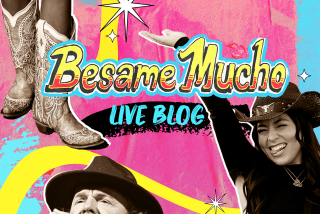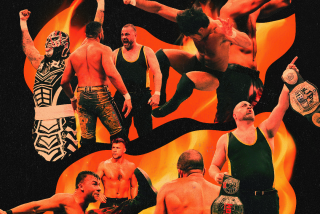Divided They Stand
- Share via
It took 10 years for guitarist Ricardo Mollo and bassist Diego Arnedo to pay a musical tribute to their friend Luca Prodan, but when they finally did, they did it in style.
A boisterous Italian with a shaved head, Prodan was the lead singer of Sumo, the Argentine band that was partially responsible for ushering in the return of rock en espan~ol in the early to middle 1980s.
Mollo and Arnedo were Prodan’s bandmates, and when the singer died in December 1987 from drug and alcohol abuse, they formed a new band under an appropriate name--Divididos, or the Divided Ones.
That trio, which has found success during the ‘90s and now includes its third drummer, Jorge Araujo, will make its Los Angeles debut Friday as the headliner for Retila magazine’s fourth annual rock awards at the Grand Olympic Auditorium.
It’s hard to believe that it took so long for such a significant band in rock en espan~ol to perform in L.A. But Divididos’ appearance is also a sign of the massive acceptance that the current movement of Latin rock is enjoying.
During the show, Divididos will probably include “Luca,” a bluesy song whose heavy beat and heart-wrenching guitar chords evoke the memory of Prodan. “Luca” is arguably the strongest track in the band’s recent album, “Gol de Mujer.”
“We had to wait a long time until we felt comfortable recording a song like that,” says Mollo. “We didn’t want it to sound as if we were taking advantage of a group as loved as Sumo was for our own benefit. Now that we have achieved our own identity, we can sing to whomever we please. Our love for Luca has been within us all along.”
No musical style was taboo for Prodan and his band. A reggae beat could at any time give way to a poppish jingle, while a punk anthem would unexpectedly reinvent itself as a poignant ballad, only to return a few minutes later to hard-core territory.
“Sumo was the greatest school I could have ever gone to,” says Mollo. “It was a dizzying, extremely creative period for all of us. We would get together, start banging an instrument or singing, and the music would just come out of nowhere. It was funny how we recorded many of our most popular songs that way.”
Prodan’s school has certainly paid off for Divididos. Mollo and Arnedo took some elements from Sumo, such as the ironic outlook on life and the acceptance of as many influences as possible, and turned them into a more mature musical proposition.
Where Divididos really made a name for itself was in the way it introduced South American folklore into the mix, without forsaking the power of the electric guitar. “It wasn’t as much a return to Argentine folklore as it was a return to our own personal roots,” explains Mollo. “Diego’s father is a famous musician in that field, and my brother is also into that music; he sings, plays the guitar and does zapateado [an Argentine folk dance]. I grew up listening to traditional music. All those influences stay within you and they end up showing up in your stuff sooner than later.”
The band’s masterpiece, 1993’s “La Era de la Boludez,” included a superb, bluesy rendition of “El Arriero Va,” a traditional song made famous by folklore legend Atahualpa Yupanqui. It was everything that rock en espan~ol was supposed to be: the statement of a new generation of Latinos who were curious about their past while also eager to express themselves through a new voice.
ON PAPER: Retila, the magazine responsible for bringing Divididos to Los Angeles, has become a staple in the burgeoning rock en espan~ol scene. Retila distinguishes itself from rival publications by its unusual format (a user-friendly 4-by-7 inches) and lavish presentation, which relies on richly colorful graphic design and a lot of photographs.
“Our goal is to provide accurate information in a positive manner, promote the significance of Latin rock and be an identity base from which young people can draw,” says Frank Barbano, the publisher of Retila, which comes out every other month and has a circulation of 50,000.
The magazine’s editorial content is guided by editor Octavio Hernandez Diaz, one of the movement’s veteran chroniclers. “We try to provide journalism that is also literary,” he says, “creating a style that combines information, humor and passion for this kind of music.”
Since Retila is a bimonthly and distributed for free, it relies on corporate sponsors and advertising for survival. The fact that such an ambitious enterprise is celebrating its fourth anniversary is testimony to the rising popularity of Latino rock in the U.S.*
*
Divididos, 15 Letras, Cuca and Prisioneros will perform Friday at the fourth annual Retila Rock Awards, Grand Olympic Auditorium, 1801 S. Grand Ave., 6:30 p.m. $25-$50. (323) 749-5171.
More to Read
The biggest entertainment stories
Get our big stories about Hollywood, film, television, music, arts, culture and more right in your inbox as soon as they publish.
You may occasionally receive promotional content from the Los Angeles Times.










